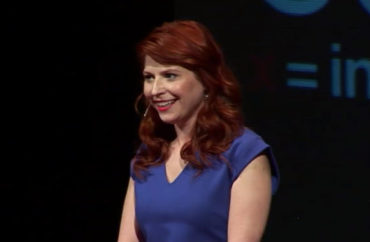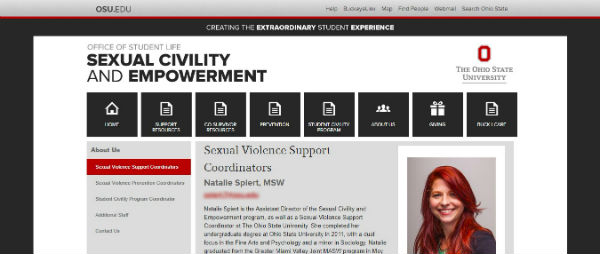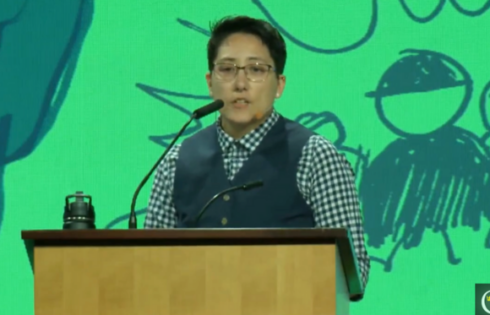
‘Jane Roe did have a motive to claim she was too drunk: she was threatened with expulsion’
A year and a half after a federal judge let a due-process lawsuit continue against Ohio State University officials, one of them may face personal ruin for her decisions during a Title IX proceeding.
“A reasonable jury could find that Natalie Spiert,” sexual violence support coordinator and advocate for “Jane Roe” during the proceeding, “knew or should have known that Jane Roe lied or misled the disciplinary board” and did not correct the record, U.S. District Judge James Graham ruled Tuesday.
Graham denied summary judgment to Spiert (below) on the issue of whether “John Doe” was deprived due process when he was not allowed to cross-examine Roe about her motive to claim that he sexually assaulted her when she did. The judge also vacated his earlier finding that Doe had no right to offer expert testimony on Roe’s state of inebriation.
“Universities have perhaps, in their zeal to end the scourge of campus sexual assaults, turned a blind eye to the rights of accused students,” Judge Graham said in explaining the importance of cross-examination: “Put another way, the snake might be eating its own tail.”
Roe was on the verge of getting kicked out of medical school – for two consecutive years of academic failure – when she first claimed Doe raped her while she was under an alcohol-induced “blackout” 10 months earlier. Doe was on the verge of graduating from a combined MBA/MD program when he was accused.
According to Brooklyn College Prof. KC Johnson, veteran chronicler of Title IX-related litigation, this is the 89th ruling against a college in a due-process lawsuit since the Obama administration imposed new accuser-friendly rules on Title IX proceedings in 2011.

Texted him ‘unsolicited’ for months – and met for drinks – after ‘blackout’ rape
Judge Graham’s summary says Roe had recently received permission from the medical school to restart her first-year classes, which she was failing, when in June 2014 she “reconnected” with Doe, an acquaintance from a year earlier.
They were at a bar “celebrating” the end of finals and decided to meet up again two weeks later. She claimed in the Title IX proceeding that she had “six alcoholic drinks” and couldn’t remember anything after about midnight.
Roe’s texts to Doe undercut some of her story. She was lucid enough after midnight to text him that she was leaving one bar and going to another, which is where he met her around 12:30 a.m. A witness said they were “giggling and having a good time” together. (Judge Graham says witness testimony is “equivocal and conflicting” about whether Roe was “significantly impaired.”)
Doe claimed she agreed to walk a “considerable distance” back to his car and go home with him. He detailed her “active participation and awareness” in their sexual activity around 3 a.m., and said they had an “affectionate” non-sexual morning after waking. She texted him later that day: “Thanks again for taking me home last night. Re-read this text this morning. Glad you can decipher bourbon talk.”
Roe claimed she “woke up naked, confused, and scared,” and that Doe said she “was really drunk” and they had sex the night before. She said she reciprocated his touching because she “felt like that I had to” but that she stayed “frozen” as he kissed her, even as she felt empowered enough to tell him no to sex.
She explained kissing him when he dropped her off at home as her attempt to “make everything seem rational, seem like I was in control, because I was in a state of shock and I had no idea what was going on.”
Roe continued to text Doe for months “but only cordially as friends,” though they went out for dinner and drinks together:
Five months after their [sexual] encounter, Jane Roe was still sending John Doe unsolicited text messages, wishing him good luck on exams, wishing him happy birthday, offering to take him out for his birthday, or even a “playful text about [John Doe’s] muscles.” … Nearly seven months after their encounter, the two ran into each other while walking outside of the hospital. Jane Roe noticed John Doe jogging, said hello, and gave him a hug. They exchanged pleasantries then went their separate ways.
Judge blocks qualified immunity for Title IX official who helped rape accuser lie by The College Fix on Scribd
The first inkling that Roe viewed their sexual encounter as an assault came shortly after the first-year program director recommended her dismissal from the medical school because Roe had failed her first year again.
She went to Spiert, the sexual violence support coordinator, days later to claim she had been raped 10 months earlier. Roe told Spiert “she was at risk of failing out of medical school,” and the two attended the Academic and Behavioral Review Committee hearing together.
Roe blamed her academic failure on the alleged rape and told the committee she would “officially” report the incident if they let her continue in medical school. The committee minutes show that Roe “plans to officially report the incident in the near future,” and it told her the following week that Roe would be allowed to stay in the program because of “the apparent impact” of the alleged rape.
Nine days later, she officially reported the alleged rape.
Spiert knew the ‘timeline’ of Roe’s decisions, but Doe didn’t
Judge Graham’s ruling was limited to whether individual Ohio State defendants including Spiert were entitled to qualified immunity for their actions in a government capacity with respect to Doe’s due process claims.
It was here that their response to Roe’s factual claims played a decisive role in Spiert’s continued presence as a defendant.
When Doe cross-examined Roe on “how well you have done academically this year,” getting at her motive to lie, she claimed the committee had already approved her request to repeat “before my decision to report this assault.”
Doe was unaware of the “timeline” of Roe’s reporting and the committee’s approval, however, so when a hearing board member asked him what “motivation” Roe had to claim she was too drunk to consent to sex, he had no answer, Graham said.
In her closing statement, Roe again claimed she did not get “any benefit” by accusing Doe of raping her, and said he was the one “with so much … to lose” that he would lie.
“Jane Roe’s testimony before the disciplinary board was essentially that she had no reason
to lie because the [committee] had decided to let her remain in medical school before her decision to report the assault,” Graham wrote: “Is that true?”
The [committee] was under the impression that Roe had already decided to formally report the sexual assault when she appeared at the hearing before it had decided whether to let her stay in school. …
Jane Roe represented to the [committee] that she was already in the process of formally reporting the sexual assault. Therefore, a reasonable jury could find that her testimony to the disciplinary board, that the [committee’s] decision to permit her to re-enroll was already decided before Roe’s “decision to report the assault,” was not truthful.
Key issue in case was Ohio State's decision to conceal from acc'd student the timeline (that the accuser had rec'd the dismissal notice two days before filing her claim, thereby raising possible motive to lie). pic.twitter.com/MYRjH3eNB6
— KC Johnson (@kcjohnson9) April 24, 2018
Graham said the issue of Roe’s “intoxication is a critical one” because it was the basis for Doe’s finding of guilt.
“Other than conflicting third-party testimony, the proof of her intoxication comes down to who you believe: John Doe, or Jane Roe,” he said:
Jane Roe did have a motive to claim she was too drunk to remember the encounter: she was threatened with expulsion from medical school and might be able to remain in school if she claimed to be the victim of a sexual assault.
Spiert “could have answered this question” because she knew the timeline of when Roe was threatened with dismissal from the medical school, “when Roe first told someone about the sexual assault,” and the “significant benefit” she got by claiming she was raped, Graham said.
‘The board might have reached a different conclusion’ if it had ‘all the facts’
The judge shot down the defendants’ claim that the proceeding’s determination of guilt “didn’t hinge on a he-said she-said credibility determination.”
The hearing board members eventually turned in affidavits stating they knew Doe’s line of questioning was intended to suggest that Roe “may have fabricated” the allegation to prevent getting kicked out, but that doesn’t explain why one of them suggested at the hearing she had “no motivation” to lie, Graham said.
Doe “will very likely be worse off” than if he finished his dual degree from Ohio State, the judge said: He had to enroll in an off-shore school and is thus no longer eligible for federal student loans or a residency in his home state, and his Ohio State disciplinary record will continue to haunt him.
In order to prevent a high risk of “erroneously disciplining Doe,” due process required that Ohio State let him cross-examine Roe on her “motive to lie,” Graham said:
The importance of Jane Roe telling the truth in the context of the university’s obligation to provide Doe with a fair hearing was highlighted by her own advocate, OSU’s Natalie Spiert, who said that if she thought Jane Roe had said something untrue at the disciplinary hearing, she “would have requested a break and consulted with legal counsel.” …
This particular situation may indeed demand the procedural protection of the university either correcting a false statement or providing the accused with the necessary information to impeach a critical witness. …
A reasonable jury could find that Jane Roe lied when she said the academic committee had already decided to permit her to repeat the first year of medical school for the third time and that she had nothing to gain by reporting the assault and no motive to lie. A reasonable jury could find that Natalie Spiert knew or should have known that Jane Roe lied or misled the disciplinary board. Notwithstanding the affidavits of the hearing board members, the board might have reached a different conclusion on Jane Roe’s credibility if it had been presented with all the facts.
‘With or without a blackout condition, [Roe] would have the ability to say “no”‘
Graham took the highly unusual step of reconsidering an earlier ruling in the case without being prompted by either party.
Doe had retained an Ohio State pharmacology professor, Albert Staubus, to testify that based on her own recollections and witness testimony, Roe “was likely capable of consenting to sexual activity, that she likely did not suffer a ‘blackout’ of memory, but even if she did, she would have been capable of consent during the ‘blackout’ period,” according to Graham.
Matthew Page, the hearing coordinator, refused to let Doe submit Staubus’s report or call him to testify, and though Doe cited the professor’s “expert credentials and his opinion,” Graham presumes that the hearing board ignored those comments.
In a section that could prove useful to judges considering the merits of “trauma informed” adjudications, Graham quotes from Staubus’s report:
The short-term memory during a blackout allows the individual to carry on conversations, perform tasks, and engage in (and even initiate) sexual activity. The disruption of the transfer of short-term memory to long-term memory prevents the individual from recalling the events and activities that occurred during the period of blackout. Based upon her reported subsequent interactions and text messages with [John Doe], it is questionable if [Jane Roe] actually did experience a blackout. However, even if she did experience a blackout, that does not mean she was alcohol impaired to the point of being incapacitated or unable to resist sexual advances. Impairment to the point of exhibiting apathy, general inertia, inability to stand or walk correspond to the Stupor stage of Alcohol Influence (0.27 to 0.40 g/dL) – blood-alcohol levels much greater than the amount of alcohol [Jane Roe] consumed. When the [bar] closed at 2:00 a.m., she was able to [walk] the 10-minute distance to [John Doe’s] parked car. With or without a blackout condition, [Jane Roe] would have the ability to say “no” to [John Doe] if she had wanted to say that.
Graham decided to vacate his earlier finding that “live expert testimony” was not required in Doe’s case, saying Staubus’s expert opinion went beyond “the knowledge of lay persons” and the “risk of an erroneous result here was substantial” without his testimony.
Ohio State rules already permit the hearing coordinator to appoint “consultants” to serve in “‘cases requiring special expertise’ … so permitting an outside expert to testify is no great departure from its current procedure,” the judge said. He gave the parties permission to conduct discovery for the first time on this issue.
Wow. Judge also reconsiders his earlier decison in light of fuller record, & says acc'd student might have due process right to present expert testimony (he had hired at OSU prof to challenge accuser's claim of incapacitation). pic.twitter.com/aR5ttwAw8Y
— KC Johnson (@kcjohnson9) April 24, 2018
MORE: Graham approves Doe’s claims on ‘biased training,’ ‘exculpatory evidence’
IMAGES: TEDx Talks/YouTube, Ohio State University
Like The College Fix on Facebook / Follow us on Twitter






Please join the conversation about our stories on Facebook, Twitter, Instagram, Reddit, MeWe, Rumble, Gab, Minds and Gettr.